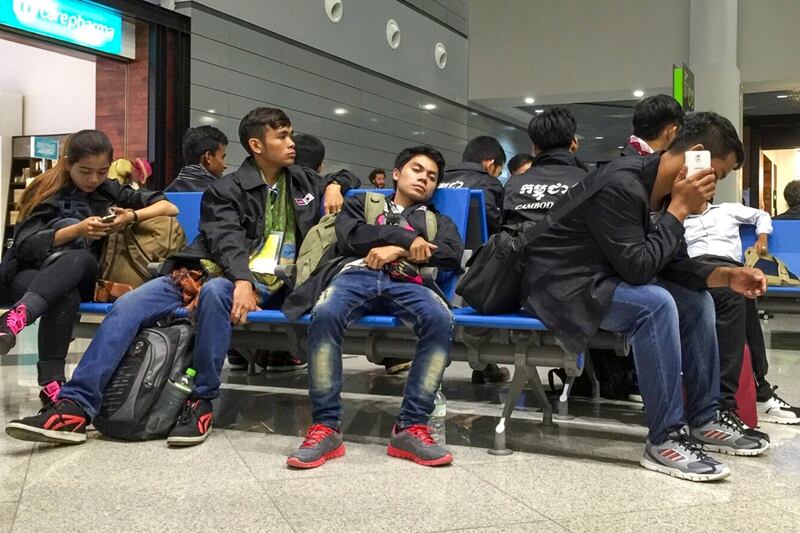The Cambodian government will stop issuing new passports to Cambodian workers in South Korea, saying people must travel to Phnom Penh to apply in person.
No reason was given, but Wednesday’s announcement from the Cambodian Embassy in Seoul comes two weeks after overseas Cambodians living in South Korea, Japan, France, Canada and Australia held protests against an economic cooperation agreement with Vietnam and Laos.
The closure of passport services in Seoul takes effect on Sunday, according to the embassy. Under the new requirements, applicants must sign documents with their inked thumbprint while in Cambodia.
There are about 54,000 Cambodian workers in South Korea employed in construction, agriculture and other industries, according to the Center for Alliance of Labor and Human Rights. They annually send home an estimated US$300 million, the center said, citing government officials.
The Seoul embassy began providing passport services a year ago, just after the National Assembly approved Hun Manet as prime minister. RFA was unable to reach Foreign Ministry spokesman Chum Sounry on Thursday for comment.
Anti-CLV protests
A Cambodian worker in South Korea who asked for anonymity for security reasons said Wednesday’s announcement was obviously a reaction to the recent demonstrations against the Cambodia-Laos-Vietnam Triangle Development Area, or CLV.
“They know that our young people have a lot to think about the country so they are trying to crash the spirits of the youths,” the worker said. “In this regime, it is very difficult to live, I do not know what to say, what to compare it to. Just look at the reality.”
RELATED STORIES
[ Cambodian political activist’s brother arrested at Thai border crossingOpens in new window ]
[ Cambodia arrests 30 amid warnings over anti-CLV demonstrationsOpens in new window ]
[ EXPLAINED: Why is Cambodia threatening arrests over a 3-nation economic zone?Opens in new window ]
[ Hun Sen warns of more arrests related to Vietnam-Laos cooperation dealOpens in new window ]
Activists have said they’re worried the CLV could cause Cambodia to lose territory or control of some of its natural resources to Vietnam.
Hun Manet, Senate President Hun Sen and other top ministers have said publicly that Cambodia would not lose territory under the CLV.
The criticism has prompted a ferocious response from Hun Sen, who ordered the arrest of three activists last month for comments made in a Facebook video and later threatened widespread arrests, citing the need to maintain stability.
Protests planned for Aug. 18 in Cambodia never took place after security forces were deployed throughout the country. More than 30 people have been arrested in Cambodia in recent weeks as authorities have sought to prevent demonstrations.
Brother of activist arrested
One of those arrested was Hay Vannith, the brother of a Cambodian political activist who lives in Japan.
Hay Vannith was detained in Poipet in northwestern Cambodia on Aug. 16 as he attempted to cross into Thailand just weeks after Hun Sen publicly threatened the activist's family.
Authorities said Hay Vannith has been moved to Prey Sar prison in Phnom Penh and faces incitement charges.

Hun Sen, 72, is the father of Hun Manet. He stepped down as prime minister last year but has retained power as president of the Senate and of the ruling Cambodian People’s Party, which won 120 of 125 seats in the July 2023 national elections after the leading opposition party wasn’t allowed to appear on the ballot.
In recent years, most of Cambodia’s political opposition has been co-opted, jailed or forced to leave the country. At the same time, tens of thousands of young Cambodians have moved abroad to find more lucrative work in countries like South Korea or Japan, where they can also speak more freely.
In South Korea, there have been some discussions on social media about organizing another protest against the CLV in September, the Cambodian worker in South Korea told RFA.
Officials have recently been asking to see the Facebook accounts of Cambodians who go to the embassy to renew or order a new passport, according to political activist Yang Sineth. They were trying to determine if the applicants had participated in the recent demonstrations, he said.
“Normally, the participants will of course have pictures, videos, photos of them [at the protests],” he said. “So, when they go back to Cambodia to get their passports, they will feel intimidated.”
Translated by Yun Samean. Edited by Matt Reed and Malcolm Foster.
